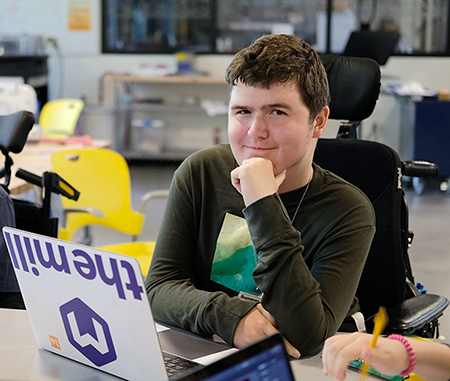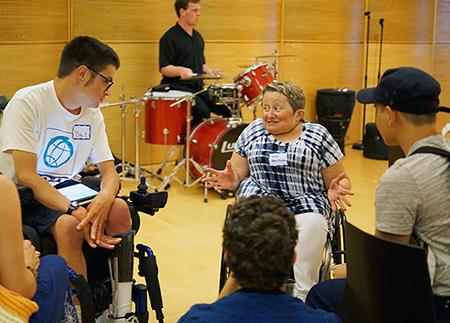Preparing Disabled Youth for College: DO-IT Parents Reflect on the UW's DO-IT Scholars Program
The DO-IT Scholars program is now accepting applications!
DO-IT Scholars is a competitive program that accepts a cohort of 15-20 students each year. A qualified applicant is a high school sophomore or junior, has a disability, lives or attends school in Washington State, and has aptitude and interest in pursuing postsecondary education. Apply by 1/30/25.
Alex Penny’s graduation from Middle Tennessee State University, with honors in political science and a minor in economics, elicited quite an emotional response from his mother, Katie.

Alex ponders a question in a UW engineering makerspace (The Mill) during DO-IT Summer Study.
Seeing her son in a graduation cap and gown carried deep meaning for the family and made a strong impression on Katie, who recalls, “He went from believing he could never go to college successfully—you know, physically—to graduating with honors a year early.” Alex, who has Duchenne muscular dystrophy, a condition that causes progressive muscle weakness and degeneration, graduated in three years. “After he got his cap and gown and sash, it hit me,” says Katie. “It hit me that, had he not been involved in the DO-IT program during high school, we wouldn't be here. I don't know what we'd be doing, but I don't think he would have made it through college. He sure didn't want to go, and he didn't know if he could do it. And I just don't know where he would have landed otherwise, but now I know.”
DO-IT Scholar Ryan Fox’s academic achievements as a student on the autism spectrum impacted his mom Kathy in similar ways. Ryan joined the DO-IT Scholars program as a high school sophomore and participated in Scholar activities through graduation. “In high school, it was a total surprise to us, but about a week before graduation they pulled him into the principal's office and said ‘Guess what. You happen to be the valedictorian, so you have to make a speech.’ It could have knocked me over with a feather because the topic of his speech was perseverance and how it takes a village to educate someone who learns differently. I’m just so proud of him for that.” Ryan went on to receive both bachelor’s and master’s degrees in music, provides teaching and tutoring to others, and has performed in orchestras- including serving as principal timpanist with the Northwest Symphony.

Ryan plays drums during a DO-IT event, while mentor Karen Braitmayer speaks with students about college preparation and universal design of physical spaces.
Alex and Ryan’ persistence and graduations are noteworthy, since disabled college students drop out at a rate more than double their non-disabled peers. Most people are unaware that among adults aged 25 – 34, around 20% of disabled people secure a bachelor's degree or higher, compared to 41% of those without a disability. The University of Washington’s Disabilities, Opportunities, Internetworking, and Technology (DO-IT) Center seeks to help change that.
For over thirty years, DO-IT’s mission has been to empower individuals with disabilities through technology, education, and advocacy. DO-IT’s work is rooted in the understanding that when the community removes barriers and provides effective accommodations, individuals with disabilities can achieve their full potential in education, employment, and community participation. DO-IT’s various programs and initiatives strive to turn this belief into reality.
DO-IT is known for promoting networking and resource sharing among students, educators, mentors, and parents. Reflecting on the complexity of transitions and helping her son apply for graduate school, Kathy shares “If you could bottle the creativity, experience, and passion that DO-IT parents and families have, you would have a force to be reckoned with! I have so enjoyed getting to know other parents who've been on a similar journey and who have found solutions, sometimes solutions that our family didn't know about.” Similarly, Katie shares “I think Alex is a better adult because of DO-IT. I think I'm a better adult because of it as well, because I learned about a lot of different disabilities that I just didn't realize. It opened my eyes a lot.”
The DO-IT Scholars Program felt like a lifeline for Kathy and Ryan. “At times, it felt like the school system literally didn't know how to help Ryan and didn't know how to advise him. I knew that Ryan wasn't going to be able to just graduate from high school in June and go off to college in September.” shares Kathy. “One of his high school counselors sent home a brochure about DO-IT Scholars, and it was exactly what I would have mapped out if I started with a blank piece of paper and tried to figure out what my kid was going to need to prepare for college.”
DO-IT offers students many opportunities to practice communication and social skills. On-site activities at the UW campus include learning to live in a dorm (sometimes with a roommate), navigating group projects, learning to compromise and otherwise get along during games and events, and communicating about the things they have learned. “I guess the social part meant more to him than the academic part, but I also think, whatever they said about how to advocate for yourself with professors did stick, because when he got to Central Washington University, he was ready to write emails and letters to all the professors and he did that every term all the way through graduate school.”
DO-IT staff have observed that students often have fears about navigating an “ableist” world that wasn’t built with them in mind. Many have had bad school experiences that could have been much more inclusive. Katie shares, “It took a lot of bravery for Alex. It took time for him to realize he overcame a lot of fear to achieve the things he set out to accomplish. I’m proud of him for that and incredibly thankful for the DO-IT community.”
This article was written by Scott Bellman, Tamitha Tidwell, and Elizabeth Woolner, all staff for the UW DO-IT Center. Want to learn more on this topic? Email us at doit@uw.edu!